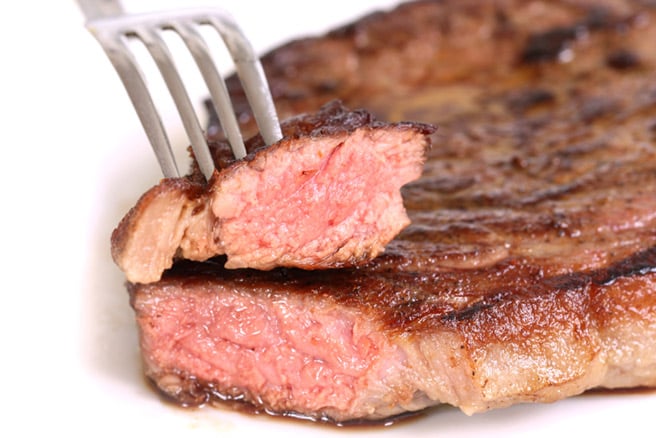 The topic of red meat and cancer risk often makes the headlines. With the results of the International Agency for Research on Cancer evaluation on red and processed meat due to be published shortly this seems a good opportunity to explain the science behind World Cancer Research Fund’s recommendation on red and processed meat.
The topic of red meat and cancer risk often makes the headlines. With the results of the International Agency for Research on Cancer evaluation on red and processed meat due to be published shortly this seems a good opportunity to explain the science behind World Cancer Research Fund’s recommendation on red and processed meat.
Our current advice to limit the consumption of red meat and avoid processed meat is based on an Expert Panel’s scientific evaluation for the 2007 Expert Report Food, Nutrition, Physical Activity and the Prevention of Cancer: a Global Perspective. Since then a further evaluation has been undertaken as part of the Continuous Update Project, an analysis of global scientific research into the link between diet, physical activity, weight and cancer.
What is red meat?
Red meat includes beef, pork, lamb and goat – foods like hamburgers, minced beef, pork chops and roast lamb. We don’t have enough evidence yet about other red-coloured meats, like duck and venison.
What is processed meat?
Processed meat is meat that has been preserved by smoking, curing or salting, or by the addition of preservatives. Examples include ham, bacon, pastrami and salami, as well as hot dogs and some sausages. Hamburgers and minced meats only count as processed meat if they have been preserved with salt or chemical additives.
The evidence for bowel cancer
In 2011 a report from the Continuous Update Project was published. It found strong evidence that eating red meat or processed meat increases the risk of bowel cancer. The analysis of eight cohort studies showed a 17 per cent increased risk per 100g red meat per day (RR: 1.17 (1.05-1.31)). The analysis of nine cohort studies found strong evidence that eating processed meat increases the risk of bowel cancer by 18 per cent per 50g processed meat per day (RR 1.18 (1.10-1.28)). For both analyses the results of the individual studies were generally consistent – adding strength to the association.
A judgement of strong evidence also requires plausible mechanisms. There are several potential reasons to explain how red and processed meat may cause bowel cancer. Red meat contains a compound which gives it’s red colour, haem, which promotes the formation of potentially carcinogenic N-nitroso compounds. In addition when red meat is cooked at high temperatures, this results in the production of compounds (heterocyclic amines and polycyclic aromatic hydrocarbons) that can cause bowel cancer in people with a genetic predisposition. In addition processed red meat has nitrites, as well as nitrates added to it as preservatives and these are thought to cause cancer. Processing also changes the nature of the meat, which may play a role in its link to cancer.
Currently there is no strong evidence that eating red or processed meat increases the risk of other cancers. The Continuous Update Project publishes reports on updated reviews of evidence so that any changes in the evidence can be reflected in our Cancer Prevention Recommendations.
What is World Cancer Research Fund’s advice?
Eat no more than 500g (cooked weight) a week of red meat, such as beef, pork and lamb. Eat little, if any, processed meat such as ham and bacon. This is because the evidence suggests eating 500g or less of red meat a week doesn’t significantly increase bowel cancer risk. Red meat is also a good source of valuable nutrients, such as protein, iron, zinc and vitamin B12, so it can contribute to a healthy, balanced diet. Processed meat on the other hand has less valuable nutrients and can be high in fat and salt, so if you eat red meat it’s best to choose fresh, unprocessed meat.
Watch our 1 minute video, which features all of our 10 Cancer Prevention Recommendations. For the latest news from us, please follow twitter.com/wcrfint.
